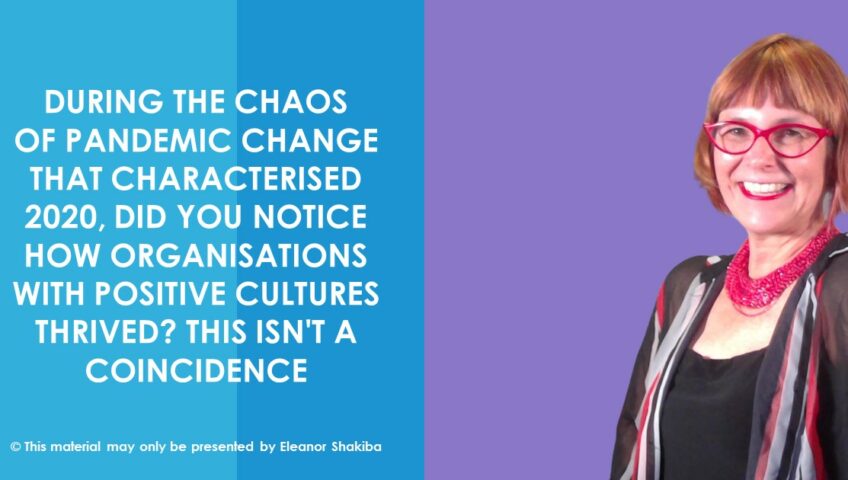If you’re struggling to ‘build’ or restructure your organisational culture, you’re probably grappling with a little-known paradox. You can’t shape culture from within that culture, because the culture is shaping you. As a positive psychology trainer with a background in anthropology, I see the task of redefining cultural norms is exactly the same as trying to see a blind spot.
Only people with a real blind spot (and I am one of them) know that you never can see a blind spot. So, the commonly used metaphor of exposing a blind spot in order to gain insight just doesn’t work. If you have a blind spot, although you know it is there, your perception is still always influenced by the ‘whole’ in your visual field. Thus, despite knowing you have areas of blindness, you will still inevitably collide with objects that fall into the blind spot. To prevent this happening, you therefore need to adapt the way you look at the world.
Exactly the same principle applies to ‘seeing’ problematic aspects of organisational culture. A trainer or facilitator situated within a business cannot fully understand the culture of that business, simply because they are part of it. This doesn’t mean internal efforts to build culture are doomed. However, it does mean it’s wise to broaden your perspective and get input from outside the system in order to accelerate your culture change efforts.
As a positive psychology trainer with a bent for the anthropological, here are three ways I suggest you do this.
- Pay attention to the gap between what people say and what they actually do. Culture change experts call this the gap between espoused theory and theory in use.
- Seek input from people outside your system. This can include customers, industry experts and culture change consultants.
- Focus your efforts on strengthening what’s working, rather than trying to eliminate what isn’t working. Being strengths focused shifts your attention to activities which will improve engagement far more than punishing people for so-called negative behavioural norms.
During the chaos of pandemic change that characterised 2020, did you notice how organisations with positive cultures thrived? This isn’t a coincidence. This is why all leaders and organisational development experts should take culture seriously. Make reflecting on and shaping culture an ongoing process, though. In this way, you will develop the reflective practices that we advocate in every session we develop in our Learn with Eleanor Shakiba online programs.
If you’re interested in using positive psychology training tools to develop thriving organisational cultures, download my free e-book, Positive Psychology Toolkit for HR and L&D Practitioners.
About the author: Eleanor Shakiba
Eleanor consults in the area of culture-building and behaviour change training. Her customers are people who want to embed positive psychology in teams and organisations. Since 1994, she has been teaching talented professionals how to think, communicate and lead in ways that build success. Eleanor holds qualifications in Social Anthropology, Positive Psychology, Counselling, Coaching, Adult Education and Neuro Linguistic Programming. Eleanor is the author of the Positive Psychology Toolkit for HR and L&D Practitioners. Download your free copy here.
